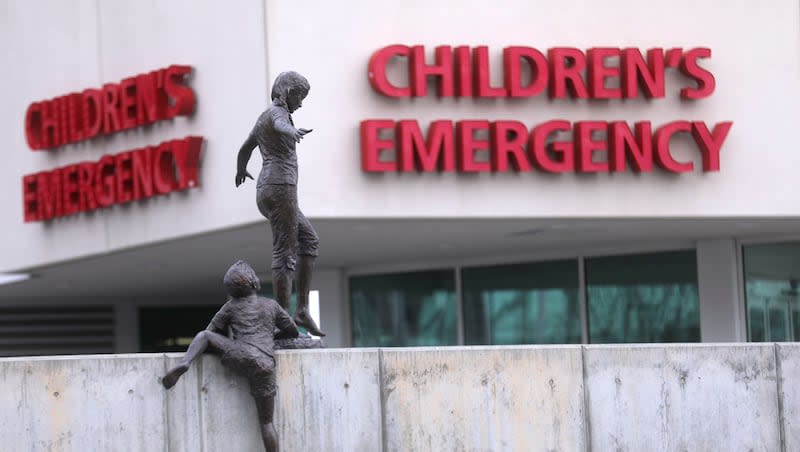Unsupervised melatonin ingestion sent thousands of young kids to ERs

Melatonin consumed by infants and young children when no one was looking accounted for as many as 11,000 emergency department visits across the U.S. between 2019 and 2022. That’s about 1 in 14 of all ER visits for children’s unsupervised medication exposures, according to a recent report from the Centers for Disease Control and Prevention.
About half of the visits involved children ages 3-5, the report said, noting that with unsupervised ingestion of medication overall, infants and children younger than 3 are typically more often involved. Half the visits for melatonin involved flavored products like melatonin gummies, and experts suggest those might have particular appeal to toddlers.
The report was prepared collaboratively with researchers from the U.S. Consumer Product Safety Commission.
Melatonin is not required to have child-resistant packaging, so the CDC recommends families make sure bottles are properly closed and keep them out of reach — and sight — of youngsters.
Per the report, “Surveillance data have limitations. Analyzing only cases resulting in (emergency department) visits likely underestimates overall melatonin ingestions by infants and young children.”
Per The Washington Post: “The good news: Very few of those children were hospitalized. Typically, mild drowsiness, headaches or dizziness are the worst side effects after children consume melatonin, according to America’s Poison Centers.”
That doesn’t mean there’s no cause for concern. Dr. Jenna Wheeler, a pediatric critical care doctor at Orlando Health Arnold Palmer Hospital for Children, told the Post that she’s seen a few cases where children have “suffered seizures, comas or death from melatonin ingestion.” She said parents should keep them out of reach the same way they would prescription medications.
CDC, in fact, has an “Up and Away” campaign to remind parents to keep all medicines “up and away and out of sight.”
What is melatonin?
Melatonin is a hormone the body makes that regulates sleep-wake cycles, according to MedlinePlus. “Darkness triggers the body to make more melatonin, which signals the body to sleep,” the article said. “Some people who have trouble sleeping have low levels of melatonin. It’s thought that adding melatonin from supplements might help them sleep.”
The article notes that melatonin, while most often used for insomnia, has also been used for jet lag, depression, pain, dementia and other conditions, “but there is no good scientific evidence to support most of these uses.” The article lists a number of conditions for which supplementation might be effective, as well as many for which it is possibly or likely ineffective. MedlinePlus said the hormone also comes with a long list of warnings and potential interactions with some drugs, herbs and supplements.
Product labels may not be accurate, either, according to CNN, which reported that “a recent study published in the journal JAMA found that 25 products labeled as melatonin gummies contained dangerous levels of the hormone while other contained no melatonin and contained only cannabidiol, or CBD.”
According to the CDC, “These discrepancies in ingredients or strength could pose additional risk” for kids.
Is melatonin safe for kids?
“More research is needed to determine if supervised use of melatonin for children is safe or needed. The use of melatonin appears ‘to be safe for most children for short-term use,’ according to the National Center for Complementary and Integrative Health, a department of the National Institutes of Health, but it points out that it is unclear how much melatonin is suitable for children and whether its benefits outweigh its possible risks,” CNN reported.
Per the article, “In general, melatonin side effects documented in children include drowsiness, headaches, agitation and increased bed-wetting or urination in the evening,” according to the national center. “There is also the potential for harmful interactions with drugs sometimes prescribed for children’s allergic reactions.”
Experts told CNN that children should not be given supplements without consulting the child’s doctor.
Over the long haul, experts don’t recommend sleep aids for children or adults to cope with sleep challenges, though they may be appropriate occasionally. Clinical psychologist Kelly Baron, who directs the Behavioral Sleep Medicine program at University of Utah Health, and Dr. Vishesh Kapur, professor of medicine at University of Washington and a spokesman for the American Academy of Sleep Medicine, recently told Deseret News that studies “suggest melatonin supplements don’t help the average individual.”
For helping adults sleep, said Kapur, “There are relatively safe prescription sleeping pills that can be used in specific situations when more natural means aren’t effective.”
But for both adults and children, many recommended sleep aids that are behavioral, not medication.

